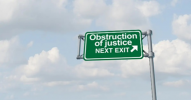 What is Obstruction of Justice?
What is Obstruction of Justice?
Obstructing justice, as it sounds, has to do with knowingly interfering in the administration of justice. Known as a “process crime,” it’s a criminal offense against the judicial process itself, similar to crimes of false and misleading statements, contempt, perjury, and failure to appear.
18 U.S. Code § 1505 - Obstruction of proceedings before departments, agencies, and committees
Whoever, with intent to avoid, evade, prevent, or obstruct compliance, in whole or in part, with any civil investigative demand…willfully withholds, misrepresents, removes from any place, conceals, covers up, destroys, mutilates, alters, or by other means falsifies any documentary material, answers to written interrogatories, or oral testimony, which is the subject of such demand; or attempts to do so or solicits another to do so.
Normally, you would have to be aware of an ongoing investigation to make loss or destruction of evidence an obstruction crime. But here is the kicker. If you crash an aircraft and tamper with the crash site, or destroy or remove evidence, you may be obstructing justice under 18 U.S.C. § 1505 because, as the pilot, you have an affirmative legal duty to timely report an aircraft accident and preserve the aircraft wreckage.
The duty to timely report crash is set forth in:
CFR 49 PART 830 - NOTIFICATION AND REPORTING OF AIRCRAFT ACCIDENTS OR INCIDENTS AND OVERDUE AIRCRAFT, AND PRESERVATION OF AIRCRAFT WRECKAGE, MAIL, CARGO, AND RECORDS

www.ecfr.gov
Subpart B - Initial Notification of Aircraft Accidents, Incidents, and Overdue Aircraft
§ 830.5 Immediate notification.
The operator of any civil aircraft…by the most expeditious means available, (shall) notify the nearest National Transportation Safety Board (NTSB) office, when:
(a) An aircraft accident or any of the following listed serious incidents occur:
(1) Flight control system malfunction or failure;
(2) Inability of any required flight crewmember to perform normal flight duties as a result of injury or illness;
(3) Failure of any internal turbine engine component that results in the escape of debris other than out the exhaust path;
(4) In-flight fire;
(5) Aircraft collision in flight;
(6) Damage to property, other than the aircraft, estimated to exceed $25,000 for repair (including materials and labor) or fair market value in the event of total loss, whichever is less.
The duty to preserve wreckage is set forth 49 CFR 830 linked and excerpted below:

www.ecfr.gov
§ 830.10 Preservation of aircraft wreckage, mail, cargo, and records.
(a) The operator of an aircraft involved in an accident or incident for which notification must be given is responsible for preserving to the extent possible any aircraft wreckage, cargo, and mail aboard the aircraft, and all records, including all recording mediums of flight, maintenance, and voice recorders, pertaining to the operation and maintenance of the aircraft and to the airmen until the Board takes custody thereof or a release is granted pursuant to § 831.12(b) of this chapter.
(b) Prior to the time the Board or its authorized representative takes custody of aircraft wreckage, mail, or cargo, such wreckage, mail, or cargo may not be disturbed or moved except to the extent necessary:
(1) To remove persons injured or trapped;
(2) To protect the wreckage from further damage; or
(3) To protect the public from injury.
(c) Where it is necessary to move aircraft wreckage, mail or cargo, sketches, descriptive notes, and photographs shall be made, if possible, of the original positions and condition of the wreckage and any significant impact marks.
(d) The operator of an aircraft involved in an accident or incident shall retain all records, reports, internal documents, and memoranda dealing with the accident or incident, until authorized by the Board to the contrary.
I posted a video by
Scoobie in #21.
Scoobie gives his opinion why Trevor Jacob likely committed felony obstruction of justice when he sanitized the crash site before reporting to the NTSB. I thought he was exaggerating but I guess not given the special duty of pilot to preserve evidence.
The only exaggeration was as to the maximum penalty. The maximum sentence for violating 18 U.S.C. § 1505 is 5 years in prison and a $250,000 fine for individuals and $500,000 per count for corporations.












